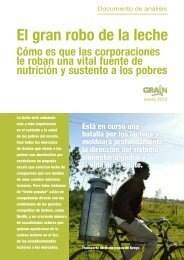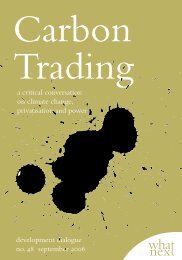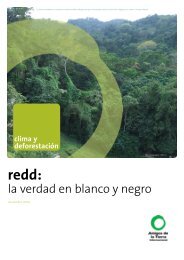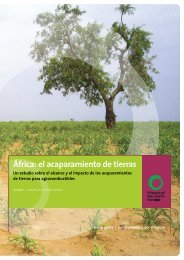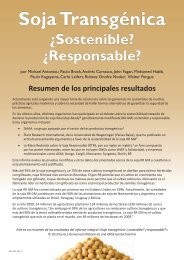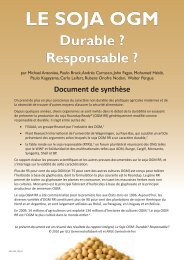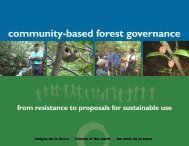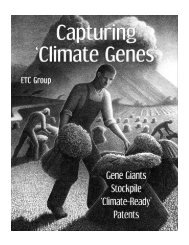Plantations, poverty and power - Critical Information Collective
Plantations, poverty and power - Critical Information Collective
Plantations, poverty and power - Critical Information Collective
Create successful ePaper yourself
Turn your PDF publications into a flip-book with our unique Google optimized e-Paper software.
20<br />
And using recycled paper is not by itself a solution to the problems caused by the pulp <strong>and</strong> paper industry.<br />
One problem is that in recent years, paper recycling has been globalised. An increasing amount of used<br />
paper from Europe has been exported to Asia, particularly to China. In 2006, European countries exported<br />
a total of 7.7 million tonnes of recycled paper to Asia, more than double the amount exported to Asia in<br />
2002. 66 Exporting used paper to China to manufacture cardboard packaging to import goods to Europe<br />
might make sense on a purely economic level. But the greenhouse gas emissions from transporting waste<br />
paper around the world can no longer be ignored. Neither can the fact that if used paper is exported from<br />
Europe that means that it is not available to be recycled in Europe – precisely where the dem<strong>and</strong> for paper<br />
products is high.<br />
Another problem with recycled paper is that there is often little regulation of the labels used on recycled<br />
paper products. A recent sc<strong>and</strong>al in Japan revealed that even when the industry says that it is using<br />
recycled paper, there may be little guarantee that it is actually doing so. In January 2008, the Japan Paper<br />
Association announced that 17 of its 38 member companies (including Oji Paper <strong>and</strong> Nippon Paper) had<br />
lied about the amount of used paper contained in their products that they sold as “recycled paper”. 67<br />
Using recycled paper is one way of reducing the impact of the North’s paper consumption. But it still<br />
doesn’t address the issue of over-consumption. The only way to address over-consumption is by reducing<br />
consumption.<br />
Journalist Richard Tomkins clearly explains the implications of Northern over-consumption in a 2006<br />
article in the Financial Times:<br />
“If . . . people really wanted to make an impact on greenhouse gas emissions, they would have to make<br />
big sacrifices – so big that it is hard to imagine any government having the courage to advocate them.<br />
“People’s top priority, for example, would need to be a reduction in their consumption of goods.<br />
Recycling bits of packaging is as nothing compared with the vast savings in energy <strong>and</strong> resources that<br />
could be made if people bought fewer products. The biggest source of greenhouse gas emissions is the<br />
energy used to manufacture <strong>and</strong> deliver the goods that end up in our homes – furniture, kitchen<br />
equipment, televisions, toys, computers, clothes <strong>and</strong> food. You do not need to recycle if you do not buy<br />
anything in the first place.”<br />
Tomkins then rejects his own suggestion: “The implications of lower consumption, however, hardly bear<br />
thinking about. . . . we would very likely be looking at the prospect of perpetual recession or worse –<br />
anathema to governments for which the annual rate of economic growth is a virility symbol.” 68<br />
The implications of runaway climate change also “hardly bear thinking about”. Consuming less would be<br />
an important contribution to avoiding climate change – <strong>and</strong> one of the ways of consuming less paper is to<br />
66 “Key Statistics 2006 European Pulp <strong>and</strong> Paper Industry”, Confederation of European Paper Industries, 2007.<br />
Some of CEPI’s statistics reflect the crazier side of globalisation. In 2005, CEPI countries imported 6 million tons of<br />
recycled paper from Latin America while they exported 4 million tons back to Latin America. “Annual Statistics 2005<br />
European Pulp <strong>and</strong> Paper Industry”, Confederation of European Paper Industries, May 2006.<br />
67 “17 papermakers falsified data: report”, Kyodo News, 26 January 2008.<br />
http://search.japantimes.co.jp/rss/nb20080126a1.html<br />
68 Richard Tomkins (2006) “Is recycling utter rubbish”, Financial Times, 8 July 2006.



